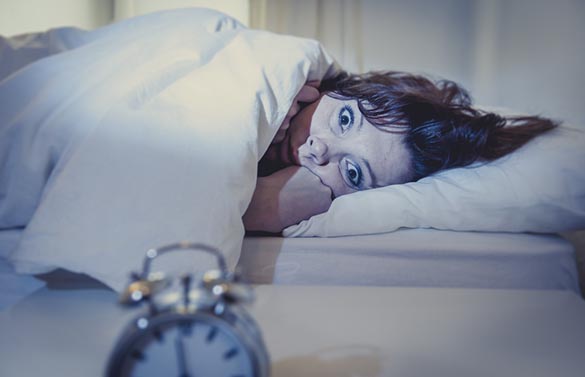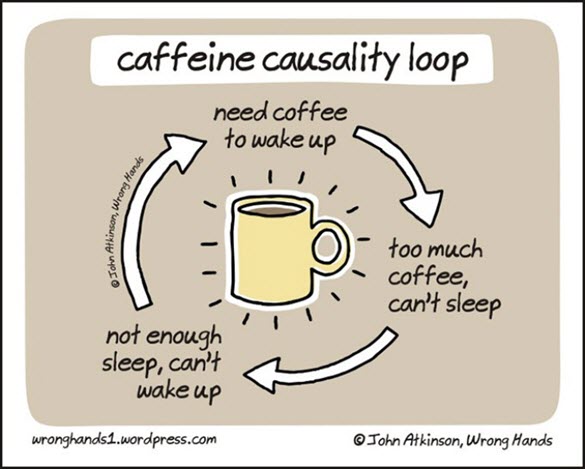![too-much-caffeine[1]](https://thelifepilot.com/wp-content/uploads/2022/11/too-much-caffeine1.jpg)
According to Matthew Walker, author of the best-selling scientific tome Why We Sleep, caffeine is one of the worst drugs on the planet for anyone who is struggling to sleep at night. It completely disrupts our sleep-wake cycle in ways that lead to dependency, overindulgence, and an inverted sleep schedule. The point is: if you’re trying to get your sleep schedule back on track, you should do your best to avoid caffeine as much as possible.
Unfortunately, for most people, avoiding caffeine is next to impossible. It’s ubiquitous in society today, and it’s even present in some of our favorite foods, like chocolate. If you can’t give up your caffeine – which is the case for most people – then you should try to shorten the half-life of caffeine in your body. And we have some helpful suggestions to help you do that!
The Half-Life of Caffeine
When you take a sip of coffee, that caffeine goes directly from your stomach into your bloodstream. It takes the other tissues in your body approximately 30 minutes to absorb the caffeine out of your bloodstream and into, say, your brain. But how long does it take your body to clear the caffeine out of your brain?
Answer: the measurable half-life of caffeine is between 5 and 7 hours for the average person.
But this number can be misleading, especially if you don’t know the true definition of “half life” when you’re talking about drugs. The half-life of a drug is how long it takes for your body to eliminate approximately 50% of the amount ingested. But that means that after 7 hours, 50% of that caffeine from your morning coffee is still in your body.
And the more caffeine you drink, the longer you extend its half-life in your system.
What Happens When Caffeine Overstays Its Welcome

“So what?” You may be asking yourself. “Why should I care how long it takes my body to eliminate caffeine?” The answer is: because of the devastating consequences that lingering caffeine has on your sleep-wake cycle.
Caffeine competes with something called adenosine for real estate in your brain. This is because they have opposite effects on your neurons. Caffeine makes you feel awake, and adenosine makes you feel sleepy. While poorly timed sleepiness from adenosine may feel like an unwanted guest, it’s important to allow your body the time and space to build up adenosine throughout the day so that you can feel sleepy at night and fall asleep effortlessly. This process is called “sleep pressure“, and the lack of it is one of the main reasons why people struggle to sleep at night.
Shortening the Half-Life for Better Sleep
In some ways, your ability to control the half-life of caffeine in your system is limited. Age is a factor which is out of your control; genetics 1 is another factor that makes a big difference. But there are some factors you can control which will help shorten the half-life of caffeine in your system so that you can sleep better at night.
Reevaluating Your Relationship to Caffeine
Probably the best thing you can do in order to reduce the impact of caffeine on your sleep schedule is to ask yourself this one important question:
What does caffeine do for you?
In other words: are you taking caffeine out of habit? To fit in, socially? Does it actually promote wakefulness in your body, or is it a placebo effect?
The answers to these questions may be uncomfortable for some, but finding the answers is important for creating an action plan that will have both a significant and beneficial impact on your life. You may find out that your reasons for consuming caffeine aren’t that important, after all. And that can make it much easier to restrict or eliminate it from your diet.
Caffeine Timing

As stated above, it can take a regular cup of coffee up to seven hours to be partially eliminated (and 14 hours to be completely eliminated) from your system. Therefore, you have to time your caffeine accordingly.
If your goal is a 10 PM bedtime, Then ideally you should avoid consuming any caffeine after 8 AM that morning. But if you can sleep just fine at a 50% elimination rate, then you could theoretically extend your caffeine window into the early afternoon hours. It all depends on your personal tolerance, and how well you can listen to your body.
Caffeine Cycling
If you simply cannot part with coffee, tea, chocolate, or caffeinated stimulants, then you should cycle on and off periodically to keep your tolerance low. The lower your tolerance, the less caffeine you will need to get the same wakefulness effect. And the less caffeine you ingest, the quicker your body can metabolize it and get it out of your system so that you can be sleepy by nightfall.
Start by cutting your daily consumption of caffeine in half for about 3 days (so if you usually drink about 4 cups of coffee per day, take it down to 2). After that, cut it in half again for another 3 days (down to 1 cup per day) Lather, rinse, and repeat this pattern until you are caffeine-free.
Stay caffeine-free for a week, and then slowly introduce caffeine back into your diet. If you can eventually wean yourself off of caffeine completely, all the better! But if you keep falling off that wagon, at least it won’t take you as much caffeine to give you the energy you need in the morning.
Caffeine Timing and Exercise
If you time your caffeine consumption in conjunction with your exercise routine, it can help reduce the overall half life. Back in 1991, the European Journal of Clinical Pharmacology published a study performed on heavy and light coffee drinkers which tested the half life, concentration, and volume of distribution of caffeine with and without exercise. Exercising within an hour of drinking a cup of coffee reduced the half life of caffeine by 43%.2
This effect was stronger in heavy coffee drinkers compared to light coffee drinkers, meaning that the more caffeine you’re used to drinking, the more robust the effect of exercise is on shortening the half life. The strategy can be very effective if you tend to drink most of your caffeine early in the morning right before exercise; putting exercise off until later in the day, however, might not be as good of a strategy for shortening the half-life of caffeine.
Can Supplements Help?
For some individuals, supplements which help improve liver health may also help shorten the half-life of caffeine in your body. But they are often expensive, hard to come by, and it’s hard to know their exact level of quality. They can also be ineffective for people who drink heavily, suffer from liver disease, or have other liver issues. As always, it’s best to talk to your doctor before you add a supplement to your health care regimen.
L-Theanine is a supplement you can take not necessarily to shorten the half-life of caffeine, but to mitigate some of its more negative effects at bedtime. Most people struggle to quiet their minds when it’s time to put their head on the pillow at night. Negative thoughts, anxiety, rumination, and the like are all exacerbated by caffeine. But L-Theanine has been shown in some studies to have a calming effect, reducing anxious thoughts and mental restlessness. 3
At the very least, L-Theanine can help you fall asleep more easily so that you can increase the quantity of hours you sleep at night. But it’s hard to say whether or not the caffeine still present in your system will have an effect on the quality of the sleep you get, even with L-Theanine negating some of the more harmful effects.
While we’re on the subject, you shouldn’t take prescription sleeping pills if you regularly ingest caffeine. This creates a vicious cycle where you need more caffeine to counteract the sleeping pills, and more sleeping pills to counteract the caffeine. All the while, your liver is being overburdened with higher and higher loads of these difficult to digest drugs, which increases their half-life in your body. We have some natural sleep supplements we can recommend as a healthy alternative; but the big takeaway is to stay away from pharmaceutical sleeping pills whenever possible.
References:
- A. Yang, A. A. Palmer, and H. de Wit, “Genetics of caffeine consumption and responses to caffeine,” Psychopharmacology 311, no. 3 (2010): 245–57, http://www.ncbi.nlm.nih.gov/pmc/articles/PMC4242593/.
- https://link.springer.com/article/10.1007/BF00315209
- https://coffeeblenders.com/blog/what-happens-when-ltheanine-meets-caffeine-the-benefits/
- “The Caffeine Causality Loop” image from https://www.ohgizmo.com/oh-well-thats-life-caffeine-causality-loop/






